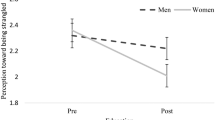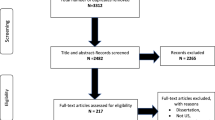Abstract
We examined condom-use negotiation strategies and condom use among 81 female sex workers (FSWs) in Phnom Penh, Cambodia. Percentages of FSWs who did not negotiate condom use or could not describe a negotiation strategy with native clients, foreign clients, and non-paying partners were 15.0, 29.0 and 67.6 %, respectively. The most common negotiation strategy used was “provision of risk information” for native clients (43.8 %) and non-paying partners (26.5 %), and “direct request” for foreign clients (39.5 %). About half could not describe more than one negotiation strategy. Consistent condom use was high with native clients (98.8 %), yet comparatively lower with foreign clients (86.9 %) and non-paying partners (26.5 %). FSWs who did not negotiate or did not know how to negotiate condom use were less likely to report condom use with non-paying regular partners. Future interventions should enhance condom negotiation strategies between FSWs and all partner types.
Resumen
Examinamos estrategias de negociación del uso del condón y uso del condón en 81 mujeres trabajadora sexual (MTS) en Phnom Penh, Cambodia. El porcentaje de MTS que no negociaron uso del condón o no pudieron describir una estrategia de negociación con clientes nativos, extranjeros, y compañeros que no pagaban fue 15.0, 29.0, y 67.6 % respectivamente. La estrategia mas común usada con clientes nativos (43.8) y con compañeros que no pagaban (36.5 %) fue “suministro de información sobre riesgos”; “petición directa” con clientes extranjeros (39.5 %). Casi la mitad de MTS no pudieron describir más de una estrategia de negociación. El uso consistente del condón fue alto entre clientes nativos (98.8 %); pero comparativamente bajo entre clientes extranjeros (86.9 %) y compañeros que no pagaban (26.5 %). MTS que no negociaron o que no supieron cómo negociar el uso del condón, fueron menos probables de reportar uso del condón entre compañeros que no pagaban. Intervenciones futuras deben mejorar las estrategias de negociación entre MTS y toda clase de compañeros.
Similar content being viewed by others
References
Saphonn V, Sopheab H, Sun LP, Vun MC, Wantha SS, Gorbach PM, et al. Current HIV/AIDS/STI epidemic: intervention programs in Cambodia, 1993–2003. AIDS Educ Prev. 2004;16(3 Suppl A):64–77.
Annual Report 2010. National Center for HIV/AIDS Dermatology and STD. 2011.
National AIDS Authority. Cambodia Country Progress Report: monitoring the Progress towards the Implementation of the Declaration of Commitment on HIV and AIDS. 2010.
Hor LB, Detels R, Heng S, Mun P. The role of sex worker clients in transmission of HIV in Cambodia. Int J STD AIDS. 2005;16(2):170–4.
NGO Joint Statistics. Database report on trafficking and rape in Cambodia 2007–2008: End Child Prostitution, Abuse and Trafficking in Cambodia. 2008.
Kim AA, Sun LP, Chhorvann C, Lindan C, Van Griensven F, Kilmarx PH, et al. High prevalence of HIV and sexually transmitted infections among indirect sex workers in Cambodia. Sex Transm Dis. 2005;32(12):745–51.
Estimation of the HIV prevalence among general population in Cambodia, 2010. National Center for HIV/AIDS Dermatology and STD. 2011.
Epidemilogical Fact Sheet on HIV and AIDS. Cambodia 2008 Update: UNAIDS/WHO Working Group on Global HIV/AIDS and STI Surveillance. 2008.
Shahmanesh M, Patel V, Mabey D, Cowan F. Effectiveness of interventions for the prevention of HIV and other sexually transmitted infections in female sex workers in resource poor setting: a systematic review. Trop Med Int Health. 2008;13(5):659–79.
Gorbach PM, Sopheab H, Chhorvann C, Weiss RE, Vun MC. Changing behaviors and patterns among Cambodian sex workers: 1997–2003. J Acquir Immune Defic Syndr. 2006;42(2):242–7.
Sopheab H, Morineau G, Neal JJ, Saphonn V, Fylkesnes K. Sustained high prevalence of sexually transmitted infections among female sex workers in Cambodia: high turnover seriously challenges the 100% Condom Use Programme. BMC Infect Dis. 2008;8:167.
Chhorvann C. Behavioral sentinel surveillance. Phnom Penh: National Center for HIV/AIDS, Dematology and STDs; 2010.
Choi SYP, Holroyd E. The influence of power, poverty and agency in the negotiation of condom use for female sex workers in mainland China. Culture Health Sexuality. 2007;9(5):489–503.
Ross MW, Crisp BR, Mansson SA, Hawkes S. Occupational health and safety among commercial sex workers. Scand J Work Environ Health. 2012;38(2):105–19.
Cheng SSY, Mak WWS. Contextual influences on safer sex negotiation among female sex workers (FSWs) in Hong Kong: the role of non-governmental organizations (NGOs), FSWs’ managers, and clients. AIDS Care. 2010;22(5):606–13.
Noar SM. Behavioral interventions to reduce HIV-related sexual risk behavior: review and synthesis of meta-analytic evidence. AIDS Behav. 2008;12(3):335–53.
Noar SM, Morokoff PJ, Harlow LL. Condom negotiation in heterosexually active men and women: development and validation of a condom influence strategy questionnaire. Psychology Health. 2002;17(6):711–35.
Wojcicki JM, Malala J. Condom use, power and HIV/AIDS risk: sex-workers bargain for survival in Hillbrow/Joubert Park/Berea, Johannesburg. Soc Sci Med. 2001;53(1):99–121.
Shannon K, Strathdee SA, Shoveller J, Rusch M, Kerr T, Tyndall MW. Structural and environmental barriers to condom use negotiation with clients among female sex workers: implications for HIV-prevention strategies and policy. Am J Public Health. 2009;99(4):659–65.
Borne Fvd. Using mystery clients to assess condom negotiation in Malawi: some ethical concerns. Stud Fam Plan. 2007;38(4):322–30.
Grayman JH, Nhan DT, Huong PT, Jenkins RA, Carey JW, West GR, et al. Factors associated with HIV testing, condom use, and sexually transmitted infections among female sex workers in Nha Trang, Vietnam. AIDS Behav. 2005;9(1):41–51.
Broaddus M, Morris H, Bryan A. ‘It’s not what you said, it’s how you said it’: Perceptions of condom proposers by gender and strategy. Sex Roles. 2010;62(9):603–14.
Otto-Salaj L, Reed B, Brondino MJ, Gore-Felton C, Kelly JA, Stevenson LY. Condom use negotiation in heterosexual African American adults: responses to types of social power-based strategies. J Sex Res. 2008;45(2):150–63.
Williams SP, Gardos PS, Ortiz-Torres B, Tross S, Ehrhardt AA. Urban women’s negotiation strategies for safer sex with their male partners. Women Health. 2001;33(3–4):133–48.
Zukoski AP, Harvey SM, Branch M. Condom use: exploring verbal and non-verbal communication strategies among Latino and African American men and women. AIDS Care. 2009;21(8):1042–9.
O’Leary A, Moore JS, Khumalo-Sakutukwa G, Loeb L, Cobb D, Hruschka D, et al. Association of negotiation strategies with consistent use of male condoms by women receiving an HIV prevention intervention in Zimbabwe. AIDS. 2003;17(11):1705–7.
Cambodia: Country Situation. UNAIDS. 2008.
Krishnan S, Dunbar MS, Minnis AM, Medlin CA, Gerdts CE, Padian NS. Poverty, gender inequities, and women’s risk of human immunodeficiency virus/AIDS. Ann NY Acad Sci. 2008;1136(1):101–10.
Langen TT. Gender power imbalance on women’s capacity to negotiate self-protection against HIV/AIDS in Botswana and South Africa. Afr Health Sci. 2005;5(3):188–97.
Murray L, Moreno L, Rosario S, Ellen J, Sweat M, Kerrigan D. The role of relationship intimacy in consistent condom use among female sex workers and their regular paying partners in the Dominican Republic. AIDS Behav. 2007;11(3):463–70.
Aveling E-L. Making sense of ‘gender’: from global HIV/AIDS strategy to the local Cambodian ground. Health Place. 2012;18(3):461–7.
Thy C. HIV transmission from husbands to wives in the context of gender/class relations, an urban slum area. Phnom Penh: Mahidol University; 2005.
NGO Joint Statistics. Database report on trafficking and rape in Cambodia 2007–2008: End Child Prostitution, Abuse and Trafficking in Cambodia; 2009.
Acknowledgments
We gratefully acknowledge the Fogarty International Center, US National Institutes of Health (AITRP D43 TW007669) and UTHealth Innovation for Cancer Prevention Research Post-doctoral Fellowship (CPRIT grant #RP101503) for funding this study and TCB’s postdoctoral training. We especially thank the staff at the Psycho-Social Service Association, Activities Social Welfare Office, Department of Social Affairs, Veteran & Youth Rehabilitation in Phnom Penh for their assistance with data collection. The content of the manuscript is solely the responsibility of the authors and does not necessarily represent the official views of the National Institutes of Health—Fogarty International Center, the Cancer Prevention and Research Institute of Texas, or the Department of Social Affairs, Veteran & Youth Rehabilitation in Phnom Penh.
Author information
Authors and Affiliations
Corresponding author
Rights and permissions
About this article
Cite this article
Bui, T.C., Markham, C.M., Tran, L.T.H. et al. Condom Negotiation and Use Among Female Sex Workers in Phnom Penh, Cambodia. AIDS Behav 17, 612–622 (2013). https://doi.org/10.1007/s10461-012-0369-9
Published:
Issue Date:
DOI: https://doi.org/10.1007/s10461-012-0369-9




